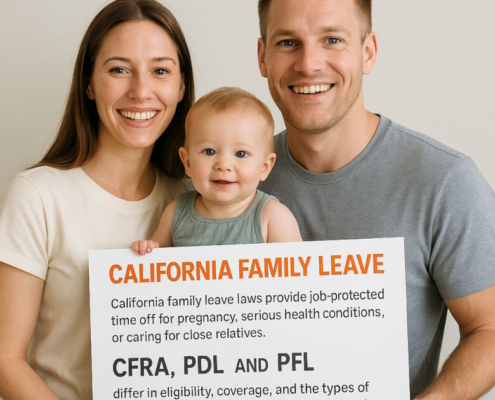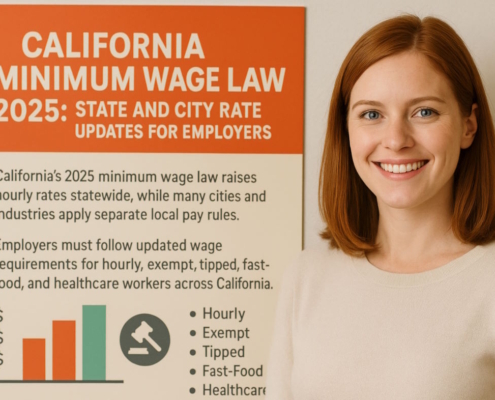Introduction
There are certain U.S. states that follow the policy of “at will,” such as California. Accordingly, employment relationships are based on the consent of both employers and employees. A professional partnership can be terminated by any party at any moment for virtually any reason or no reason at all, and giving prior notice is not required by law. However, it is not totally true that this employment legislation permits a company to fire any worker for any cause at any time, as many people believe.
Employers have a lot of latitude in choosing who gets hired and fired, but they are not allowed to base their choices on unlawful intent. Employers cannot discriminate against their employees on the basis of certain, legally established personal characteristics under the law. California implements state laws that seek to stop employee harassment and discrimination, while the EEOC (Equal Employment Opportunity Commission) enforces the same regulations at the level of the federal government.
How Does At-Will Employment in California Operate?
The majority, but not each, of the relationships are considered at-will employment in California. Certain workers will have employment agreements that specify exactly what conditions and limitations the company and employee must adhere to. The conditions under which a company may terminate an employee are typically outlined in a contract of employment. However, the at-will employment in California applies to employees who are not bound by a contract.
Giving workers the legal right to terminate their employment at any time without facing consequences is the rationale underlying at-will employment in California. The truth is that many workers feel that their careers are in jeopardy since they can be dismissed at any time under the at-will employment in California.
Wrongful Termination: What is it?
Although they can fire workers whenever they like, some employers fail to take into consideration workers’ protected personal characteristics while letting him or her go.
For example, if a company is required to eliminate a position that is held by two people, the company is not allowed to fire one person based on their ethnicity, religion, or other personal characteristics.
Particularly difficult for the affected persons are the cases of wrongful termination litigation because it is easy to hide the reason for being fired and claim the law granting at-will employment as the reason. An employee who has been wrongly terminated may seek help from a skilled employment law lawyer to make their employer accountable for discrimination.
In order to make a company liable for wrongful termination, a claim that describes the case in detail should be filed with the EEOC. Should the employee need help with filling in the necessary claim paperwork and gathering any relevant documentation, he or she may consult with their attorney.
Statements from former workers and coworkers, as well as communication between the company and the worker, may be included. The EEOC will give the complainant a Notice of Right to Sue, enabling them to pursue a civil lawsuit against the company for wrongful dismissal, if it finds that the termination was unlawful and a misuse of at-will employment legislation.
Based on the magnitude of misconduct on the part of the employer and the size of the company, the EEOC might reward the claimant with compensation. Additionally, a civil case may allow the worker to recover lost payments and compensate him for the intentional emotional torment done to him by the employer.
FAQs
1. Is It Lawful to Fire Someone Without Cause?
A: California’s at-will employment statute permits an employer to terminate a worker for any justified reason, regardless of cause and without prior warning. Employers are not permitted to fire workers for no cause or for unlawful reasons. A company would probably give some explanation for their decision to fire someone, but they might not base it on unlawful or discriminatory grounds. It would be hard for them to justify terminating someone for “no cause.”
2. What is California’s at-will status signifying?
A: In terms of at-will employment in California, it is entirely up to any worker to terminate his or her employment at any time and without notice to the employer. It also means that an employer can always terminate the employment of a worker for any just cause. The reasoning behind this regulation is that it keeps workers from feeling trapped in positions they don’t want to keep, even though it may appear uneven in favor of businesses.
3. What are at-will employment’s three exceptions?
A: Not all job relationships fall within the definition of at-will employment in California. The 3 exceptions are public policy, written and implied contracts of employment, and implied agreements of good faith. A public policy cannot be violated by an employer when terminating the services of a worker, and when the employer and the worker have an agreement or contract that has been there for a long time, the employer cannot terminate the services of the employee in contravention.
4. Am I able to sue my employer once a termination happens on an at-will basis?
A: At-will job offers your employer the liberty to fire you for no reason at any time. If you believe that your employer was biased against you or made up his mind to dismiss you due to your religion, sex, race, or some other constitutionally protected personal qualities – you should contact the labor law lawyer as soon as possible to find out whether you have the right for the wrongful dismissal or not.
The employment laws of California can be puzzling, and the at-will employment norm more often than not ends up being a wall that keeps workers from pursuing wrongful dismissal suits against their employers. In order to make the company liable, a lawyer experienced in his/her work can help his/her client in obtaining the necessary evidence for bringing an EEOC complaint. They can use their skill and expertise to serve your cause.































